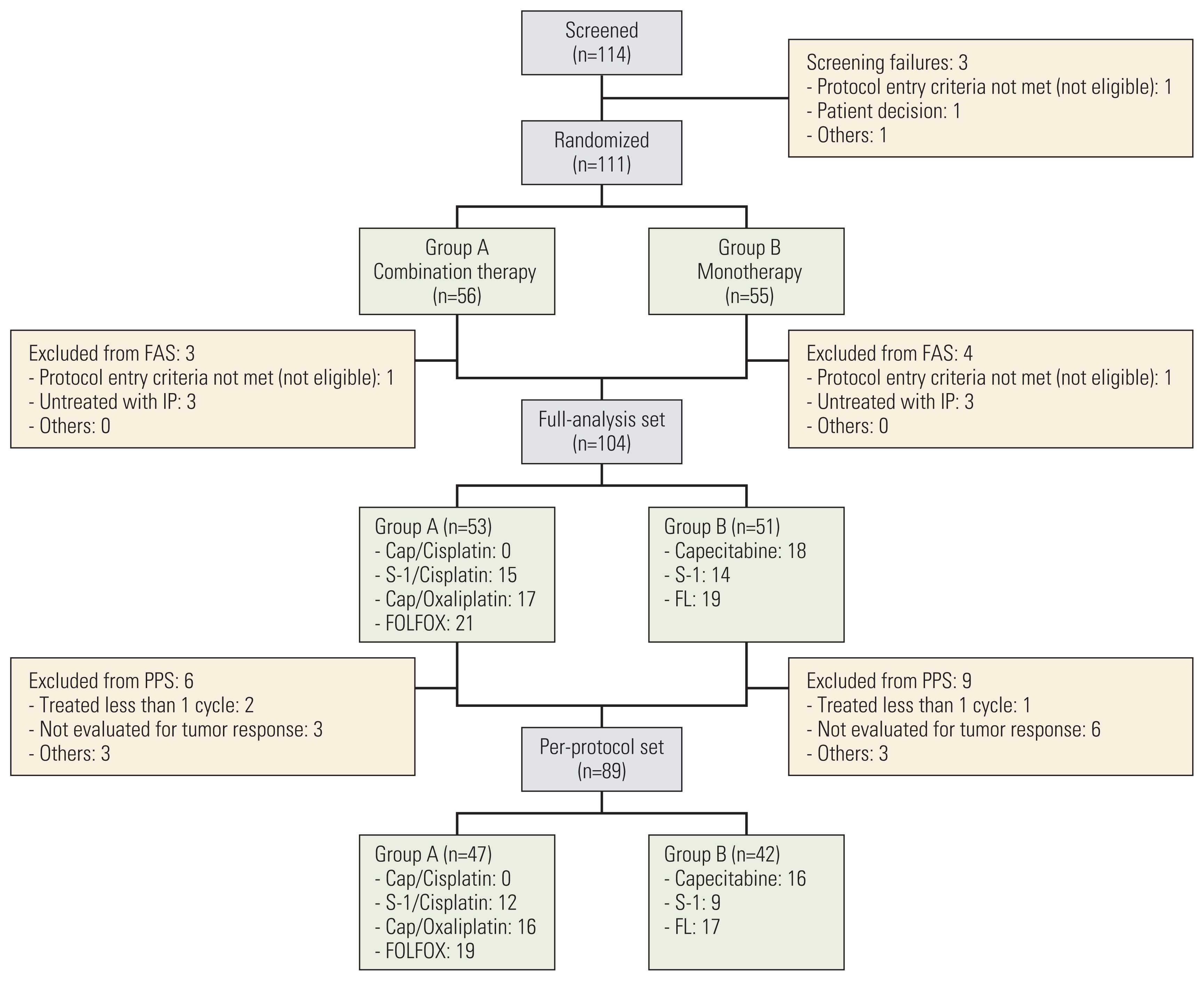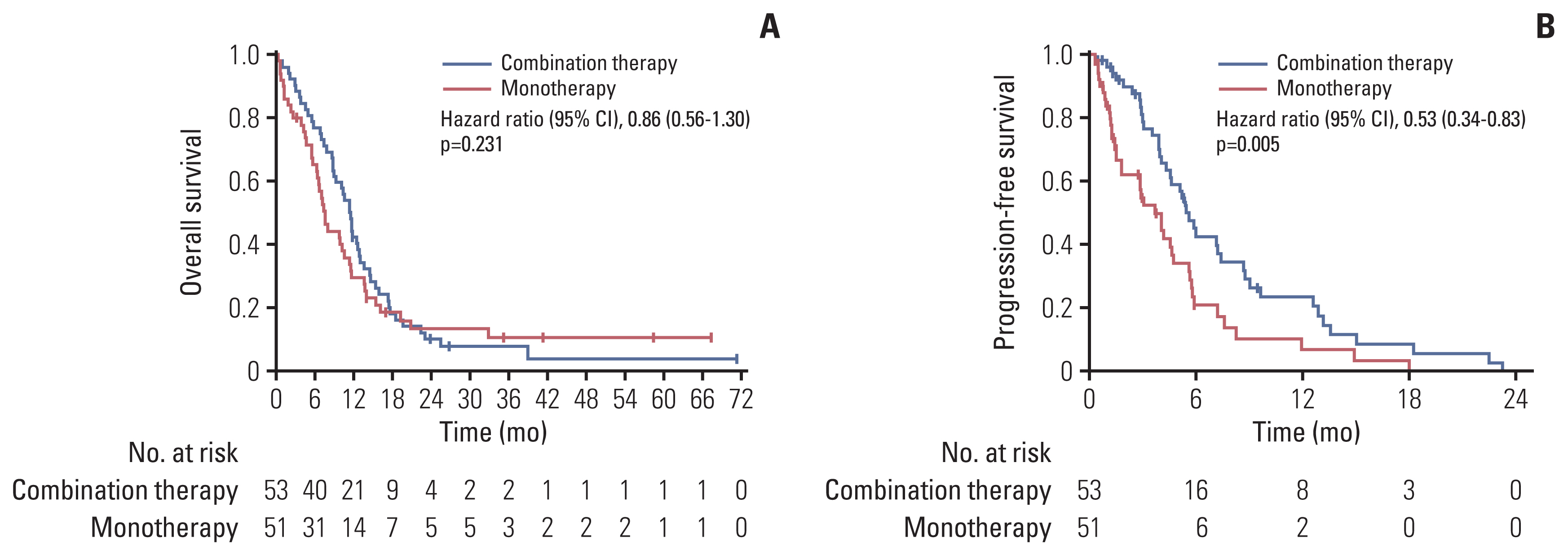Cancer Res Treat.
2023 Oct;55(4):1250-1260. 10.4143/crt.2023.333.
A Phase 3 Randomized Clinical Trial to Compare Efficacy and Safety between Combination Therapy and Monotherapy in Elderly Patients with Advanced Gastric Cancer (KCSG ST13-10)
- Affiliations
-
- 1Department of Internal Medicine, Seoul National University Bundang Hospital, Seoul National University College of Medicine, Seongnam, Korea
- 2Department of Internal Medicine, Hallym University Sacred Heart Hospital, Anyang, Korea
- 3Department of Oncology, Asan Medical Center, Seoul, Korea
- 4Department of Internal Medicine, Chungbuk National University Hospital, Chungbuk National University College of Medicine, Cheongju, Korea
- 5Department of Internal Medicine, Inje University Busan Paik Hospital, Busan, Korea
- 6Division of Oncology and Hematology, Department of Internal Medicine, International St. Mary’s Hospital, Catholic Kwandong University College of Medicine, Incheon, Korea
- 7Center for Gastric Cancer, Research Institute and Hospital, National Cancer Center, Goyang, Korea
- 8Department of Internal Medicine, Yeungnam University Medical Center, Daegu, Korea
- 9Department of Hematology-Oncology, Inje University Haeundae Paik Hospital, Busan, Korea
- 10Department of Internal Medicine, Kangbuk Samsung Hospital, Sungkyunkwan University School of Medicine, Seoul, Korea
- 11Department of Internal Medicine, Eunpyeong St. Mary’s Hospital, College of Medicine, The Catholic University of Korea, Seoul, Korea
- 12Department of Internal Medicine, Inje University Sanggye Paik Hospital, Seoul, Korea
- 13Department of Internal Medicine, SMG-SNU Boramae Medical Center, Seoul National University College of Medicine, Seoul, Korea
- 14HERINGS, The Institution of Advanced Clinical & Biomedical Research, Seoul, Korea
- KMID: 2547799
- DOI: http://doi.org/10.4143/crt.2023.333
Abstract
- Purpose
This study evaluated whether combination therapy is more effective than monotherapy in elderly patients with metastatic or recurrent gastric cancer (MRGC) as first-line chemotherapy.
Materials and Methods
Elderly (≥ 70 years) chemo-naïve patients with MRGC were allocated to receive either combination therapy (group A: 5-fluorouracil [5-FU]/oxaliplatin, capecitabine/oxaliplatin, capecitabine/cisplatin, or S-1/cisplatin) or monotherapy (group B: 5-FU, capecitabine, or S-1). In group A, starting doses were 80% of standard doses, and they could be escalated to 100% at the discretion of the investigator. Primary endpoint was to confirm superior overall survival (OS) of combination therapy vs. monotherapy.
Results
After 111 of the planned 238 patients were randomized, enrollment was terminated due to poor accrual. In the full-analysis population (group A [n=53] and group B [n=51]), median OS of combination therapy vs. monotherapy was 11.5 vs. 7.5 months (hazard ratio [HR], 0.86; 95% confidence interval [CI], 0.56 to 1.30; p=0.231). Median progression-free survival (PFS) was 5.6 vs. 3.7 months (HR, 0.53; 95% CI, 0.34 to 0.83; p=0.005). In subgroup analyses, patients aged 70-74 years tended to have superior OS with combination therapy (15.9 vs. 7.2 months, p=0.056). Treatment-related adverse events (TRAEs) occurred more frequently in group A vs. group B. However, among severe TRAEs (≥ grade 3), there were no TRAEs with a frequency difference of > 5%.
Conclusion
Combination therapy was associated with numerically improved OS, although statistically insignificant, and a significant PFS benefit compared with monotherapy. Although combination therapy showed more frequent TRAEs, there was no difference in the frequency of severe TRAEs.
Keyword
Figure
Reference
-
References
1. Bray F, Ferlay J, Soerjomataram I, Siegel RL, Torre LA, Jemal A. Global cancer statistics 2018: GLOBOCAN estimates of incidence and mortality worldwide for 36 cancers in 185 countries. CA Cancer J Clin. 2018; 68:394–424.
Article2. Hong S, Won YJ, Lee JJ, Jung KW, Kong HJ, Im JS, et al. Cancer statistics in Korea: incidence, mortality, survival, and prevalence in 2018. Cancer Res Treat. 2021; 53:301–15.
Article3. SEER Cancer stat facts: stomach cancer [Internet]. Bethesda, MD: National Cancer Institute; 2023 [cited 2023 May 25]. Available from: https://seer.cancer.gov/statfacts/html/stomach.html .4. Kim NK, Park YS, Heo DS, Suh C, Kim SY, Park KC, et al. A phase III randomized study of 5-fluorouracil and cisplatin versus 5-fluorouracil, doxorubicin, and mitomycin C versus 5-fluorouracil alone in the treatment of advanced gastric cancer. Cancer. 1993; 71:3813–8.
Article5. Van Cutsem E, Moiseyenko VM, Tjulandin S, Majlis A, Constenla M, Boni C, et al. Phase III study of docetaxel and cisplatin plus fluorouracil compared with cisplatin and fluorouracil as first-line therapy for advanced gastric cancer: a report of the V325 Study Group. J Clin Oncol. 2006; 24:4991–7.
Article6. Cunningham D, Starling N, Rao S, Iveson T, Nicolson M, Coxon F, et al. Capecitabine and oxaliplatin for advanced esophagogastric cancer. N Engl J Med. 2008; 358:36–46.
Article7. Kang YK, Kang WK, Shin DB, Chen J, Xiong J, Wang J, et al. Capecitabine/cisplatin versus 5-fluorouracil/cisplatin as first-line therapy in patients with advanced gastric cancer: a randomised phase III noninferiority trial. Ann Oncol. 2009; 20:666–73.
Article8. Ajani JA, Rodriguez W, Bodoky G, Moiseyenko V, Lichinitser M, Gorbunova V, et al. Multicenter phase III comparison of cisplatin/S-1 with cisplatin/infusional fluorouracil in advanced gastric or gastroesophageal adenocarcinoma study: the FLAGS trial. J Clin Oncol. 2010; 28:1547–53.
Article9. Al-Batran SE, Hartmann JT, Probst S, Schmalenberg H, Hollerbach S, Hofheinz R, et al. Phase III trial in metastatic gastroesophageal adenocarcinoma with fluorouracil, leucovorin plus either oxaliplatin or cisplatin: a study of the Arbeitsgemeinschaft Internistische Onkologie. J Clin Oncol. 2008; 26:1435–42.
Article10. Koizumi W, Narahara H, Hara T, Takagane A, Akiya T, Takagi M, et al. S-1 plus cisplatin versus S-1 alone for first-line treatment of advanced gastric cancer (SPIRITS trial): a phase III trial. Lancet Oncol. 2008; 9:215–21.
Article11. Lee KW, Chung IJ, Ryu MH, Park YI, Nam BH, Oh HS, et al. Multicenter phase III trial of S-1 and cisplatin versus S-1 and oxaliplatin combination chemotherapy for first-line treatment of advanced gastric cancer (SOPP trial). Gastric Cancer. 2021; 24:156–67.
Article12. Lee KW, Lee JH, Kim JW, Kim JW, Ahn S, Kim JH. Population-based outcomes research on treatment patterns and impact of chemotherapy in older patients with metastatic gastric cancer. J Cancer Res Clin Oncol. 2016; 142:687–97.
Article13. Lee JL, Kang YK, Kang HJ, Lee KH, Zang DY, Ryoo BY, et al. A randomised multicentre phase II trial of capecitabine vs S-1 as first-line treatment in elderly patients with metastatic or recurrent unresectable gastric cancer. Br J Cancer. 2008; 99:584–90.
Article14. Hwang IG, Ji JH, Kang JH, Lee HR, Lee HY, Chi KC, et al. A multi-center, open-label, randomized phase III trial of first-line chemotherapy with capecitabine monotherapy versus capecitabine plus oxaliplatin in elderly patients with advanced gastric cancer. J Geriatr Oncol. 2017; 8:170–5.
Article15. Aaronson NK, Ahmedzai S, Bergman B, Bullinger M, Cull A, Duez NJ, et al. The European Organization for Research and Treatment of Cancer QLQ-C30: a quality-of-life instrument for use in international clinical trials in oncology. J Natl Cancer Inst. 1993; 85:365–76.
Article16. Blazeby JM, Conroy T, Bottomley A, Vickery C, Arraras J, Sezer O, et al. Clinical and psychometric validation of a questionnaire module, the EORTC QLQ-STO 22, to assess quality of life in patients with gastric cancer. Eur J Cancer. 2004; 40:2260–8.
Article17. Osoba D, Rodrigues G, Myles J, Zee B, Pater J. Interpreting the significance of changes in health-related quality-of-life scores. J Clin Oncol. 1998; 16:139–44.
Article18. Hall PS, Lord SR, Collinson M, Marshall H, Jones M, Lowe C, et al. A randomised phase II trial and feasibility study of palliative chemotherapy in frail or elderly patients with advanced gastroesophageal cancer (321GO). Br J Cancer. 2017; 116:472–8.
Article19. Hall PS, Swinson D, Cairns DA, Waters JS, Petty R, Allmark C, et al. Efficacy of reduced-intensity chemotherapy with oxaliplatin and capecitabine on quality of life and cancer control among Older and frail patients with advanced gastroesophageal cancer: the GO2 phase 3 randomized clinical trial. JAMA Oncol. 2021; 7:869–77.20. Hutchins LF, Unger JM, Crowley JJ, Coltman CA Jr, Albain KS. Underrepresentation of patients 65 years of age or older in cancer-treatment trials. N Engl J Med. 1999; 341:2061–7.
Article21. Talarico L, Chen G, Pazdur R. Enrollment of elderly patients in clinical trials for cancer drug registration: a 7-year experience by the US Food and Drug Administration. J Clin Oncol. 2004; 22:4626–31.
Article22. Kemeny MM, Peterson BL, Kornblith AB, Muss HB, Wheeler J, Levine E, et al. Barriers to clinical trial participation by older women with breast cancer. J Clin Oncol. 2003; 21:2268–75.
Article23. Hurria A, Cohen HJ, Extermann M. Geriatric oncology research in the cooperative groups: a report of a SIOG special meeting. J Geriatr Oncol. 2010; 1:40–4.
Article24. Hurria A, Togawa K, Mohile SG, Owusu C, Klepin HD, Gross CP, et al. Predicting chemotherapy toxicity in older adults with cancer: a prospective multicenter study. J Clin Oncol. 2011; 29:3457–65.
Article25. Extermann M, Boler I, Reich RR, Lyman GH, Brown RH, DeFelice J, et al. Predicting the risk of chemotherapy toxicity in older patients: the Chemotherapy Risk Assessment Scale for High-Age Patients (CRASH) score. Cancer. 2012; 118:3377–86.
Article26. Kim JW, Lee YG, Hwang IG, Song HS, Koh SJ, Ko YH, et al. Predicting cumulative incidence of adverse events in older patients with cancer undergoing first-line palliative chemotherapy: Korean Cancer Study Group (KCSG) multicentre prospective study. Br J Cancer. 2018; 118:1169–75.
Article27. Kanesvaran R, Li H, Koo KN, Poon D. Analysis of prognostic factors of comprehensive geriatric assessment and development of a clinical scoring system in elderly Asian patients with cancer. J Clin Oncol. 2011; 29:3620–7.
Article28. Soubeyran P, Fonck M, Blanc-Bisson C, Blanc JF, Ceccaldi J, Mertens C, et al. Predictors of early death risk in older patients treated with first-line chemotherapy for cancer. J Clin Oncol. 2012; 30:1829–34.
Article
- Full Text Links
- Actions
-
Cited
- CITED
-
- Close
- Share
- Similar articles
-
- Chemotherapy for Advanced Gastric Cancer in Elderly Patients
- Recent Progress in Immunotherapy for Advanced Gastric Cancer
- FOLFOX-4 Combination Chemotherapy as a First-line Treatment in Patients with Advanced Gastric Cancer
- Clinical Trial Protocol for ROSELLA: a phase 3 study of relacorilant in combination with nab-paclitaxel versus nab-paclitaxel monotherapy in advanced platinum-resistant ovarian cancer
- Combination chemotherapy with docetaxel and cisplatin as first-line treatment in advanced gastric cancer: is it a new effective chemotherapy?




